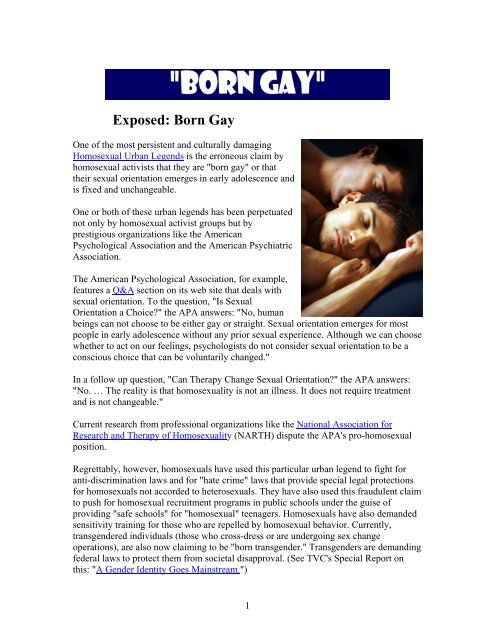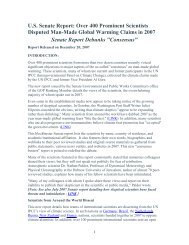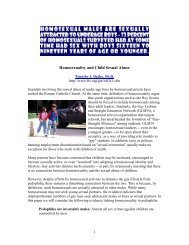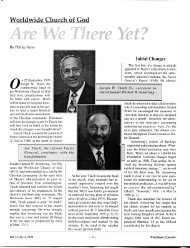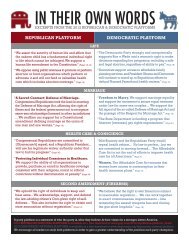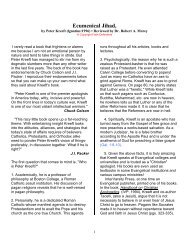Are People Born Gay?--PDF - NJIAT
Are People Born Gay?--PDF - NJIAT
Are People Born Gay?--PDF - NJIAT
Create successful ePaper yourself
Turn your PDF publications into a flip-book with our unique Google optimized e-Paper software.
Exposed: <strong>Born</strong> <strong>Gay</strong><br />
One of the most persistent and culturally damaging<br />
Homosexual Urban Legends is the erroneous claim by<br />
homosexual activists that they are "born gay" or that<br />
their sexual orientation emerges in early adolescence and<br />
is fixed and unchangeable.<br />
One or both of these urban legends has been perpetuated<br />
not only by homosexual activist groups but by<br />
prestigious organizations like the American<br />
Psychological Association and the American Psychiatric<br />
Association.<br />
The American Psychological Association, for example,<br />
features a Q&A section on its web site that deals with<br />
sexual orientation. To the question, "Is Sexual<br />
Orientation a Choice?" the APA answers: "No, human<br />
beings can not choose to be either gay or straight. Sexual orientation emerges for most<br />
people in early adolescence without any prior sexual experience. Although we can choose<br />
whether to act on our feelings, psychologists do not consider sexual orientation to be a<br />
conscious choice that can be voluntarily changed."<br />
In a follow up question, "Can Therapy Change Sexual Orientation?" the APA answers:<br />
"No. … The reality is that homosexuality is not an illness. It does not require treatment<br />
and is not changeable."<br />
Current research from professional organizations like the National Association for<br />
Research and Therapy of Homosexuality (NARTH) dispute the APA's pro-homosexual<br />
position.<br />
Regrettably, however, homosexuals have used this particular urban legend to fight for<br />
anti-discrimination laws and for "hate crime" laws that provide special legal protections<br />
for homosexuals not accorded to heterosexuals. They have also used this fraudulent claim<br />
to push for homosexual recruitment programs in public schools under the guise of<br />
providing "safe schools" for "homosexual" teenagers. Homosexuals have also demanded<br />
sensitivity training for those who are repelled by homosexual behavior. Currently,<br />
transgendered individuals (those who cross-dress or are undergoing sex change<br />
operations), are also now claiming to be "born transgender." Transgenders are demanding<br />
federal laws to protect them from societal disapproval. (See TVC's Special Report on<br />
this: "A Gender Identity Goes Mainstream.")<br />
1
Great cultural and legal changes have taken place in our society because of this<br />
Homosexual Urban Legend-but it is slowly but surely being debunked. This is being done<br />
not only by conservative psychologists and psychiatrists, but by the admissions of<br />
homosexual researchers themselves.<br />
Dr. Robert Spitzer, a NARTH associate, was one of the main forces behind the American<br />
Psychiatric Association's 1973 decision to remove homosexuality as a mental illness from<br />
the APA's Diagnostic and Statistical Manual (DSM).<br />
Dr. Spitzer is now convinced that men and women who have a homosexual orientation<br />
can change through therapy. His most recent findings were published in Archives of<br />
Sexual Behavior (Vol. 32, No. 5, October 2003, pp. 403-417).<br />
NARTH summarized his findings on its web site. Dr. Spitzer interviewed some 200 men<br />
and women who reported changes from homosexual to heterosexual orientation that<br />
lasted five years or longer. According to Spitzer, his findings show that "the mental<br />
health professionals should stop moving in the direction of banning therapy that has, as a<br />
goal, a change in sexual orientation."<br />
One of the most compelling articles to dispel the notion that homosexuality is genetically<br />
determined, fixed, and unchangeable is: "The Innate-Immutable Argument Finds No<br />
Basis in Science: In Their Own Words: <strong>Gay</strong> Activists Speak About Science, Morality,<br />
Philosophy," by Drs. A. Dean Byrd, Shirley Cox, and Jeffrey W. Robinson. This essay is<br />
published on the National Association for Research and Therapy of Homosexuality web<br />
site.<br />
The authors of this study carefully quote a number of homosexual researchers who have<br />
worked for years to locate a "gay gene" or some other genetic basis for homosexuality.<br />
They have failed and are now admitting that such evidence may never be found.<br />
Homosexual researcher Dean Hamer, for example, attempted to link male homosexuality<br />
to a bit of DNA located at the tip of the X chromosome. He has written: "Homosexuality<br />
is not purely genetic…environmental factors play a role. There is not a single master<br />
gene that makes people gay. . . . I don't think we will ever be able to predict who will be<br />
gay."<br />
Homosexual researcher Simon LeVay, who studied the hypothalamic differences<br />
between the brains of homosexual and heterosexual men noted: "It's important to stress<br />
what I didn't find. I did not prove that homosexuality is genetic, or find a genetic cause<br />
for being gay. I didn't show that gay men are born that way, the most common mistake<br />
people make in interpreting my work. Nor did I locate a gay center in the brain."<br />
Homosexual researchers Bailey and Pillard conducted the famous "twins study" quoted<br />
by homosexual activist groups to promote the idea that being "gay" is genetic. The study<br />
found that among those twins studied, the researchers found a rate of homosexuality of<br />
2
52% (both twins homosexuals); 22% among non-identical twins; and a 9.2% rate among<br />
non-twins.<br />
This was hailed by homosexual activists groups and by the media as supposedly proving<br />
that homosexuality is genetic. The study actually proved the opposite. As Byrd, et al,<br />
note: "This study actually provides support for environmental factors. If homosexuality<br />
were in the genetic code, all of the identical twins would have been homosexual."<br />
In short, the three most famous studies in recent years that homosexual activists use to<br />
claim that homosexuality is genetic prove no such thing. In fact, two of the authors of<br />
these studies admit their research has not proven a genetic basis to homosexuality.<br />
Catholic Psychiatrists Offer Insights<br />
In June, 2002, Catholic psychiatrists with the Catholic Medical Association in Pewaukee,<br />
Wisconsin, sent a letter of concern to the U.S. Conference of Catholic Bishops and<br />
offered to help the Catholic Church deal with its scandals over priests with same-sex<br />
attractions. Many of these priests are not pedophiles in the clinical sense or the legal<br />
sense of the word. These are pederasts or homosexuals who are attracted to teenage boys<br />
or young adults.<br />
The letter of concern notes: "There is no verifiable evidence that same-sex attraction is<br />
genetically determined. If same-sex attraction were genetically determined, identical<br />
twins would always have the same sexual attraction pattern. Numerous studies of twins<br />
have shown that this is not the case. And there are numerous studies documenting change<br />
of sexual attraction pattern (see 'Homosexuality and Hope,' available at<br />
www.cathmed.org). This entire statement is available on the Catholic Medical<br />
Association web site. This association is helping to debunk the notion that individuals are<br />
"born gay."<br />
If Not Genes,<br />
Then What Causes Homosexuality?<br />
Regent University's Law Review for Spring, 2002, is entirely devoted to a discussion of<br />
various aspects of homosexuality, including the origins and causes of homosexual<br />
behaviors. The Law Review includes a study, " Homosexuality: Innate and Immutable?"<br />
by Dr. A. Dean Byrd and Stony Olsen.<br />
After discussing the lack of evidence on the genetic origins of homosexuality, Dr. Byrd<br />
and his associate detail the various environmental factors that can lead a person into a<br />
homosexual lifestyle.<br />
3
Gender Confusion: Dr. George Rekers, an expert on<br />
Gender Identity Disorders, is author of dozens of<br />
scholarly research papers on homosexuality and<br />
wrote Growing Up Straight: What Every Family<br />
Should Know About Homosexuality in 1982. He is also<br />
editor of Handbook of Child and Adolescent Sexual<br />
Problems, published in 1995. Dr. Rekers stated in 1995,<br />
that "Gender nonconformity in childhood may be the single<br />
common observable factor associated with homosexuality.<br />
Some of the typical childhood factors leading to<br />
homosexuality are: feeling of being different from other<br />
children; perception of father as being distant, uninvolved<br />
and unapproving; perception of mother being too close, too<br />
involved; diminished or distorted masculinity or<br />
femininity; premature introduction to sexuality; and gender<br />
confusion.<br />
Failure To Internalize Maleness: Dr. Joseph Nicolosi, president of the National<br />
Association for Research and Therapy of Homosexuality has written: "Homosexuality is<br />
a developmental problem that is almost always the result of problems in family<br />
relationships, particularly between father and son. As a result of failure with father, the<br />
boy does not fully internalize male gender identity, and develops homosexuality. This is<br />
the most commonly seen clinical model."<br />
Dr. George Rekers, writing in Growing Up Straight, observes: "Many studies of<br />
homosexual patients as well as of nonpatient homosexuals have established a classic<br />
pattern of background family relations. The most frequent family pattern reported from<br />
the male homosexuals includes a binding, intimate mother in combination with a hostile,<br />
detached father."<br />
Sexual Abuse By Same-Sex Predator: In studies conducted by Diana Shrier and Robert<br />
Johnson in 1985 and 1988, males who had been sexually abused as children were almost<br />
seven times as likely as non-molested boys to become homosexuals.<br />
Dr. Gregory Dickson recently completed a doctoral dissertation on the pattern of<br />
relationships between mothers and their male homosexual sons. His paper is entitled: "An<br />
Empirical Study of the Mother/Son Dyad in Relation to the Development of Adult Male<br />
Homosexuality: An Object Relations Perspective."<br />
Dr. Dickson's study is reviewed on the NARTH web site. His study sheds new light on<br />
the relationship between early childhood sexual abuse and a child's later involvement in<br />
homosexual behaviors. According to Dickson, an alarming 49% of homosexuals<br />
surveyed had been molested compared to less than 2% of heterosexuals.<br />
His study affirms previous findings of Dr. David Finkelhor (1984), which found that boys<br />
victimized by older men were four times more likely to be currently involved in<br />
4
homosexual behaviors than were non-victims. As Finkelhor observed: "It may be<br />
common for a boy who has been involved in an experience with an older man to label<br />
himself as homosexual (1) because he has had a homosexual experience and (2) because<br />
he was found to be sexually attractive by a man. Once he labels himself homosexual, the<br />
boy may begin to behave consistently with the role and gravitate toward homosexual<br />
activity." (Child Sexual Abuse: New Theory and Research, New York: The Free Press,<br />
1984).<br />
Dr. Dickson's study suggests that sexual abuse should be considered in evaluating the<br />
factors that contribute to the development of adult homosexual behaviors. Dickson<br />
writes: "An experience of sexual abuse could possibly contribute to the sexualizing of the<br />
unmet needs for male affection, attention, and connection."<br />
Dr. Dickson continues: "Given the relational deficits [with his mother] experienced by<br />
the male child, it is also possible that the molestation, as devastating as it may have been<br />
emotionally, simultaneously may be experienced by some of the boys as their first form<br />
of adult male affection, as well as something relational that is not shared in common with<br />
his mother."<br />
Counselor Dr. Robert Hicks, author of The Masculine Journey, has written: "…In<br />
counseling gay men for twenty years, I have not had one yet whom I would say had a<br />
normative childhood or normative adolescent development in the sexual arena. More<br />
often than not I have found stories of abusive, alcoholic, or absent (physically and<br />
emotionally) fathers: stories of incest or first experiences of sex forced upon them by<br />
older brothers, neighborhood men, or even friends. I sometimes find these men have had<br />
early exposure to pornography…."<br />
Homosexuals <strong>Are</strong> Made, Not <strong>Born</strong><br />
In summary, the most credible research to date on homosexuality-and research conducted<br />
years ago-demonstrates that no one is "born gay." The homosexual is suffering from a<br />
developmental problem, which frequently starts out in childhood as gender confusion,<br />
family dysfunction, or molestation.<br />
From a Christian perspective, homosexual behavior is also labeled a sin and a sexual<br />
perversion. It is a behavior that must be repented of. The sin is akin to allowing oneself to<br />
become addicted to pornography or to drugs. These behaviors can be overcome-but the<br />
person must want to change!<br />
The Bible-both the Old and New Testaments-clearly condemn homosexuality as a sin and<br />
a sexual perversion. Dr. Robert Gagnon, assistant professor of New Testament at<br />
Pittsburgh Theological Seminary has written a definitive text on how God views<br />
homosexuality. In The Bible and Homosexual Practice: Texts and Hermeneutics, Gagnon<br />
proves beyond doubt that the Bible consistently condemns homosexual behavior but calls<br />
the homosexual-and other sinners-to repentance and salvation. Gagnon urges Christians<br />
5
to resist the homosexual agenda but to love the sinner by "befriending the homosexual<br />
while withholding approval of homosexual behavior."<br />
There is hope for homosexuals through developing a relationship with Jesus Christ,<br />
through both religious and secular counseling programs, and through support groups that<br />
provide accountability for those struggling with same-sex attractions and self-destructive<br />
behaviors.<br />
Organizatio ns like Exodus International, Parents and Friends of Ex-<strong>Gay</strong>s, NARTH,<br />
Reality Resources, and others can provide the resources that homosexuals need to be set<br />
free from these self-destructive sexual behaviors. Freedom is possible for those who wish<br />
to be free!<br />
Traditional Values Coalition<br />
Website: www.traditionalvalues.org/<br />
6


